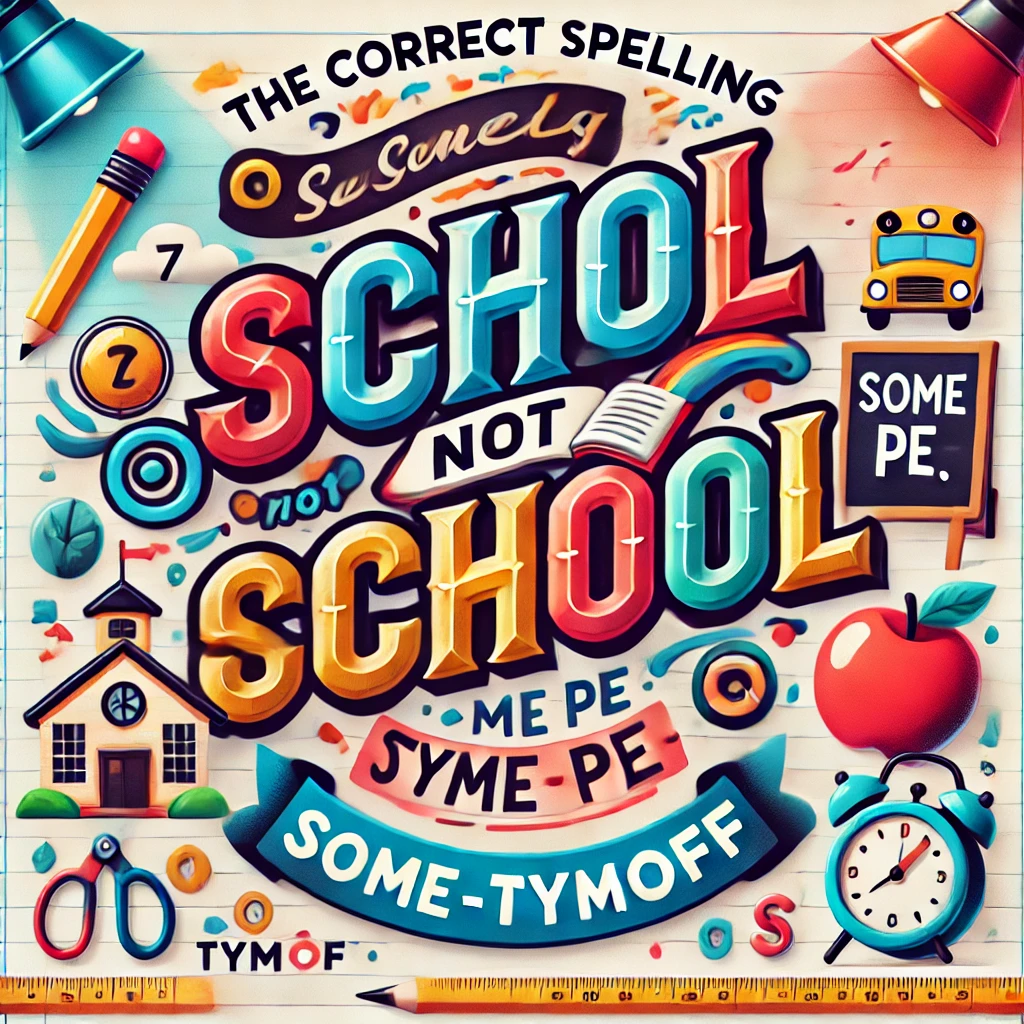
Introduction
In our journey through education and communication, we often overlook the importance of correct spelling. The phrase “The correct spelling is school not school. some pe – tymoff” humorously reminds us of the significance of accurate spelling in everyday life. This article will discuss why spelling matters, common mistakes, and strategies to enhance spelling skills. By understanding the nuances of spelling, we can improve our communication abilities and ensure our messages are clear and effective.
The Importance of Spelling in Communication
Spelling is not just a technical skill; it plays a crucial role in effective communication. Correct spelling ensures that our messages are understood as intended. Imagine trying to make sense of a text filled with misspellings — it can quickly become frustrating and confusing. Clear spelling reflects professionalism and attention to detail, which is vital in both academic and professional settings. The phrase “The correct spelling is school not school. some pe – tymoff” highlights how easily misunderstandings can arise if we neglect spelling.
Proper spelling also shows respect for the reader. Poor spelling can lead to misinterpretation of ideas or, worse, completely change the intended meaning. For example, a simple misspelling can transform the word “school” into something else entirely. Mastering spelling is therefore essential for effective communication.
Why People Commonly Misspell Words
Even experienced writers can occasionally misspell words. Common reasons for these errors include:
-
Typographical Errors
Typing quickly can easily lead to hitting the wrong keys, resulting in errors such as “shcool” instead of “school.” Such mistakes are often unintentional but can be confusing if not corrected.
-
Phonetic Mistakes
Phonetic errors occur when people spell words based on how they hear them. If someone mishears the pronunciation of “school,” they might spell it as “shool.” This issue often results from regional accents or variations in pronunciation.
-
Autocorrect Failures
Autocorrect features in digital devices can sometimes change a correctly spelled word to something incorrect. Knowing the correct spelling can help you spot these errors before they reach the reader.
The Role of Pronunciation in Spelling Mistakes
Pronunciation significantly impacts how we spell words. Many people tend to spell words phonetically, which can lead to errors, especially in words with silent letters or unexpected spelling patterns.
Take the word “school” as an example. Its “ch” combination can be confusing for those who pronounce it differently, leading to misspellings like “scole” or “shcool.” By understanding and practicing the correct spelling, we can reduce these errors. The phrase “The correct spelling is school not school. some pe – tymoff” serves as a reminder to pay attention to the details of spelling.
Tips for Correct Spelling
To avoid mistakes like those highlighted in “The correct spelling is school not school. some pe – tymoff,” try the following strategies:
-
Practice Regularly
Frequent practice helps reinforce correct spelling. Spend a few minutes daily writing down commonly misspelled words to familiarize yourself with their correct forms.
-
Use Mnemonic Devices
Mnemonics can be useful for remembering tricky spellings. For example, you can create a phrase to remember the letters in “school” like “Smart Children Have Only One Laptop.” This makes the learning process fun and effective.
-
Read Extensively
Reading regularly helps expose you to the correct spelling of words in context. Whether you’re reading books, articles, or blogs, paying attention to spelling can reinforce correct forms in your memory.
-
Employ Spell Check Tools
Use digital spell-check tools to catch mistakes, but always verify suggestions, as these tools may not be 100% accurate. Understanding correct spelling helps make informed decisions on spell-check recommendations.
The Educational Significance of Correct Spelling
Understanding the correct spelling of basic words like “school” is essential for educational success. Using accurate phrases, such as “The correct spelling is school not school. some pe – tymoff,” emphasizes the importance of attention to detail. Good spelling is crucial in academic contexts, where clarity and precision are key to effectively expressing ideas.
The Impact of Technology on Spelling
Technology has both improved and complicated spelling practices. Tools like spell check and autocorrect have made it easier to identify errors, but relying solely on these tools can lead to over-dependence and complacency. Balancing the use of technology with personal learning helps build a strong spelling foundation.
Commonly Misspelled Words and How to Remember Them
Here are some frequently misspelled words and tricks to remember them:
- Definitely – Often misspelled as “definately.” Remember that “definitely” contains “fine,” which is definite.
- Separate – Commonly written as “seperate.” Think of “A rat in a separate cage.”
- Occurrence – Frequently misspelled as “occurance” or “occurence.” Remember there are two “c”’s and two “r”’s.
- Embarrass – Often written as “embarass.” Keep in mind it has double “r” and double “s.”
FAQs about Spelling Errors
What are some tips for remembering tricky words?
Mnemonic devices, regular practice, and extensive reading are effective ways to remember tricky words. Writing words down can also reinforce their correct forms.
Why do native speakers still make spelling mistakes?
Even native speakers make spelling errors due to typographical mistakes, phonetic misunderstandings, or autocorrect failures. Regular practice and attention to detail are crucial for minimizing mistakes.
How can I improve my spelling skills?
Reading extensively, using mnemonic devices, practicing regularly, and employing spell-check tools are all effective ways to improve your spelling skills.
Conclusion
In conclusion, the phrase “The correct spelling is school not school. some pe – tymoff” emphasizes the importance of accurate spelling. Whether you are a student, a professional, or a casual writer, paying attention to spelling details is essential for clear communication and reflects a commitment to quality. By practicing consistently and utilizing helpful tools, you can minimize mistakes and enhance your writing skills.




